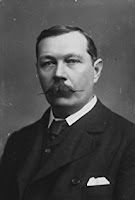Thomas C. Foster, Twenty-Five Books That Shaped America
We have some idea what is meant when we hear the phrase "cult movies." I picture midnight showings of The Rocky Horror Picture Show, the fans in costumes from the film saying favorite lines as they come on the screen. Or fans of The Big Lebowski, also in costume, devoting an entire weekend to watching the movie, bowling and drinking white Russians.
But what about cult novels? Is there such a thing? Thomas C. Foster mentions On the Road and Tropic of Capricorn, but have devoted fans of these books ever behaved in a like manner to fans of those movies?
In their 1998 book Cult Fiction: A Reader's Guide, Andrew Calcutt and Richard Shephard discuss Jack Kerouac and Henry Miller, the authors of the two "cult" books Foster mentions, as well as dozens of others. They define cult fiction as "literature from the margins and extremes." It is outside the mainstream, they say, and in one way or another is viewed as deviant. Most of the writers they mention fit this definition: Richard Brautigan, Hunter S. Thompson, Hubert Selby Jr., Ken Kesey and Jim Harrison, to name just a few. But other writers they include seem to me about as mainstream as can be: Nick Hornby, Joyce Carol Oates, Elmore Leonard, Dorothy Parker, Raymond Chandler, Fyodor Dostoevsky, Ring Lardner, Flannery O'Connor, Robert Louis Stevenson and J.D. Salinger, for example.
I think Calcutt and Shephard are right to talk about cult fiction in terms of authors rather than individual books, but I am not so sure the fact that writers used drugs (like Thomas de Quincey) or were homosexual (like Truman Capote) necessarily makes them cult writers. Even the subject matter dealt with in their books doesn't define a cult writer unless there actually is, or has been, a cult. Elmore Leonard and Ring Lardner have had many fans over the years, myself included, but have they ever inspired anything that might be termed a cult?
Yet a few writers, none of them mentioned by Calcutt and Shephard, do strike me as being the focus of cult-like activity.
Arthur Conan Doyle
 |
| Arthur Conan Doyle |
In addition, Holmes is the subject of countless books, both nonfiction and pastiches, as well a nonstop series of movies and television programs based on the character. There is a room in the Toronto Public Library, which I have visited, that is devoted to Holmes, and rooms at 221B Baker Street in London, an address that is itself fictional, are visited each day by fans from around the world. I have been there as well.
Jane Austen
C.S. Lewis
In his case, it is not just his fiction, such as the Narnia Chronicles and his science fiction novels, but also his theological and academic works that continue to generate interest and a flow of books and articles. Annual festivals, such as the one held each fall in Petosky, Mich., give fans an opportunity to hear scholars talk about his work.
You might also be able to make a case for certain other writers, such as William Shakespeare, Charles Dickens and Mark Twain. The Harry Potter stories and The Lord of the Rings stories have generated cult-like behavior, but this may have more to do with the movies than the books themselves.
Movies generate cults more easily than books simply because they can be experienced as a group and because they are visual, better lending themselves to costumes and other imitative behavior. Cult fiction takes a different form, but as Sherlock Holmes, Jane Austen and C.S. Lewis have shown, it is possible.
No comments:
Post a Comment